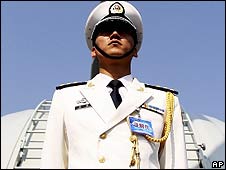A recent sign posted on the window of a Beijing restaurant refuses to serve certain nationalities due to current international maritime disputes between state actors. Sarah Danruo Wang analyzes how historic disputes on sea (and on land) shape national identity and loyalty.
As I am nearing graduation, I keep thinking about vignettes of my incredibly awkward, enlightening, and unforgettable first year that really shaped some of my research interests today. As I was researching for a paper on the Franco-Prussian War, I encountered an odd little anecdote about, how decades back, a group of people watched an opera so cathartic that when it concluded, Belgium was born. Since then I have researched on what it means to be German through the ambitions of Bismarck, Soviet Russian during Lenin’s implementation of national language policies, Greek during the fall of Constantinople, Czechoslovakian amidst such an unstable geography, and Azerbaijani in a seemingly ethnically homogenous, enigmatic Iran. Personally, I was born in Beijing and I have lived for four to five years each in Ottawa, the San Francisco Bay Area, Vancouver, and now Toronto, a mobile life that renders me identity-less. If our characters are chiseled through our reactions with our struggles, is the national identity similarly (re)created through interpretation of conflict?
A restaurant in Beijing has a faded sign on its window: “This shop does not receive the Japanese, the Philippines (sic), the Vietnamese, and dog.” I admit that I am not shocked by this almost boastful racism from my actual hometown. Chinese signs were once the tangible symbols of lost in translation, yet this one is succinctly clear. Why specifically these three countries? It turns out that each has a maritime dispute with China. Japan is obviously at odds over the Diaoyu Islands, Vietnam and the Philippines over other islands in the South China Sea. Although this is an isolated incident, albeit provoking nasty reactions from the nationalities in question, the state has not asked the owner to remove the sign as the owner indicates that “this is my own conduct.” What many news outlets did not mention is that this sign is eerily reminiscent of a well-told Chinese story of a sign reading, “Chinese and Dogs Not Admitted”, in Shanghai’s Huangpu Park in the 1920s. Although Chinese people were barred from entering local parks, the exact wording of this sentiment is disputed. Nevertheless, the restauranteur’s homage exhibits the dialectic between perceived relative status, grafted from previous experiences to today’s prejudices.
When I was living in the United States, I recited the pledge of allegiance every day. When I returned to Canada, I did not remember the words to the national anthem, let alone the Royal Anthem that we had to sing on the way out of every assembly. I watched my social studies teacher be the only one in the auditorium refusing to stand for “God Save the Queen” because of an alternate stanza belittling the Scots. The nationalism in my Chinese peers and their parents were diluted at best, one met with cultural detachment and youthful apathy. I want to blame the decreased interest in politics on 1989 but I know better now that it was the tradeoff of prioritizing economic opportunity and the proliferation of material culture in my generation.
But, in all honesty, with a foreign conflict, specifically one that makes the average Chinese feel cheated over our poignant, invaded past, the Chinese public do not disappoint. A traditional Chinese hero is Zheng He, whom we proudly claimed to have travelled the seas centuries before the Europeans. Yet we rarely note that Zheng is not ethnically Han but of Muslim Hui descent. Victory and defeats at sea were captured in Japanese visual culture during the Sino-Japanese conflicts of the late 19th century. Looking since the 1990s, when the nation was once again challenged by non-governmental oversight and the retreat of ideology, China has reacted mostly to land-based or conceptual conflicts. China Can Say No was a book published in 1996 that rejected Americanization of culture. The bombing of the Chinese Embassy in Belgrade in 1999 by NATO produced protests that were verbally supported by Vice-president Hu Jintao. The 2008 Summer Olympics was a triumphant display of manufactured cohesion, a unity produced by a collective urgency to witness the human form at its apex. And now, the historical antagonism with Japan is suddenly reignited over rocks. Is this solidarity perhaps just a defense mechanism to perceived insecurity rooted from a historical perspective of either relative inferiority or regional supremacy? Or perhaps, it is just a bit more comforting to confront the other in the company of one’s peers?
As for Canada, the Rush-Bagot Treaty of 1818 demilitarized the Great Lakes region by permitting only one naval vessel for each of Britain and the United States on Lake Ontario. This demilitarization was seen as a first step testing the precarious trust after the War of 1812. Furthermore, the Naval Service Act of 1910 created the Canadian Navy with second-hand British vessels, the HMCS Niobe and HMCS Rainbow and established the Naval College in Halifax. Opponents derided the effort, calling the formation the “tin-pot Navy”, yet this was a clear assertion of Canadian autonomy in self-protection separate from, but loyal to the Commonwealth. To inject some humor in maritime security, in 2002, Denmark erected a flag and left some Danish vodka on Hans Island, in a bizarre attempt to provoke a reaction over a rock that burdens Canadian-Danish relations. Five years later, in another effort to elicit a reaction, Russia planted a flag in the seabed of the arctic to prove “the arctic is Russian,” illustrating that Russian cooperation and aggression will perpetually be a mercurial cycle. Current maritime concerns in the arctic revolve around Canada’s ability to react to potential oil spills and pollution through drilling and shipping and Ottawa’s assistance to indigenous maritime development.
I do not want to poeticize maritime divides but any fifth grade geography class will reveal that the continents were once together, like a finished puzzle, known as Pangaea. It is quite fitting that with continental drift, distance produced distinct people. Only with the advancement of maritime technology, ambition and the lust for adventure led to the discovery of the New World. Shipping and maritime security determined wealth and relative power, one that allowed for the early flourishing of The Netherlands and divorced England from the Continent. Before man audaciously conquered the skies, maritime passages were the medium for capitalism, asymmetric development, ideological escape, and the arrival of the other. It is quite ironic that of all the effort that China used to build a wall to keep barbarians on horses out, it was defeated by other barbarians on ships at its ports. The Austro-Hungarian Empire’s lack of a navy exacerbated its economic stagnation as it steadily shed its maritime-efficient proxies through succession or independence. Centuries later, this problem persisted as a Russian ambassador once stated that he did not understand why the Czechs need a navy when the country is obviously landlocked. The Czech representative sharply replied that he does not understand why Russians need a ministry of cultural affairs. Incidents like the Komagata Maru and Pearl Harbor lacerate our collective memories of how national and human security engage and isolate us collectively in international affairs as troubled waters and their cargo reach our horizons.
In a restaurant, I usually do not order my entrées with a side of racism but if anything, this sign, amongst the vast informational stimuli across a city like Beijing, indicates how ubiquitous disputes trickle down to even the most obscure places, subliminally shaping who we are, what we fear, and how we react.



